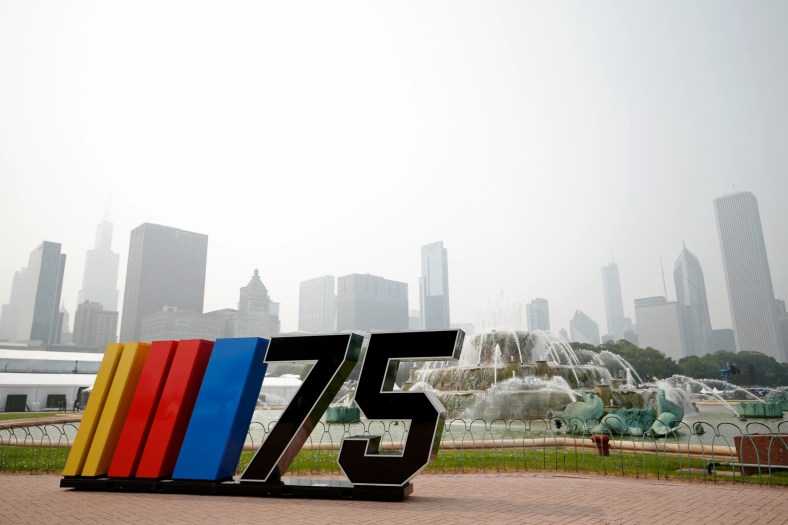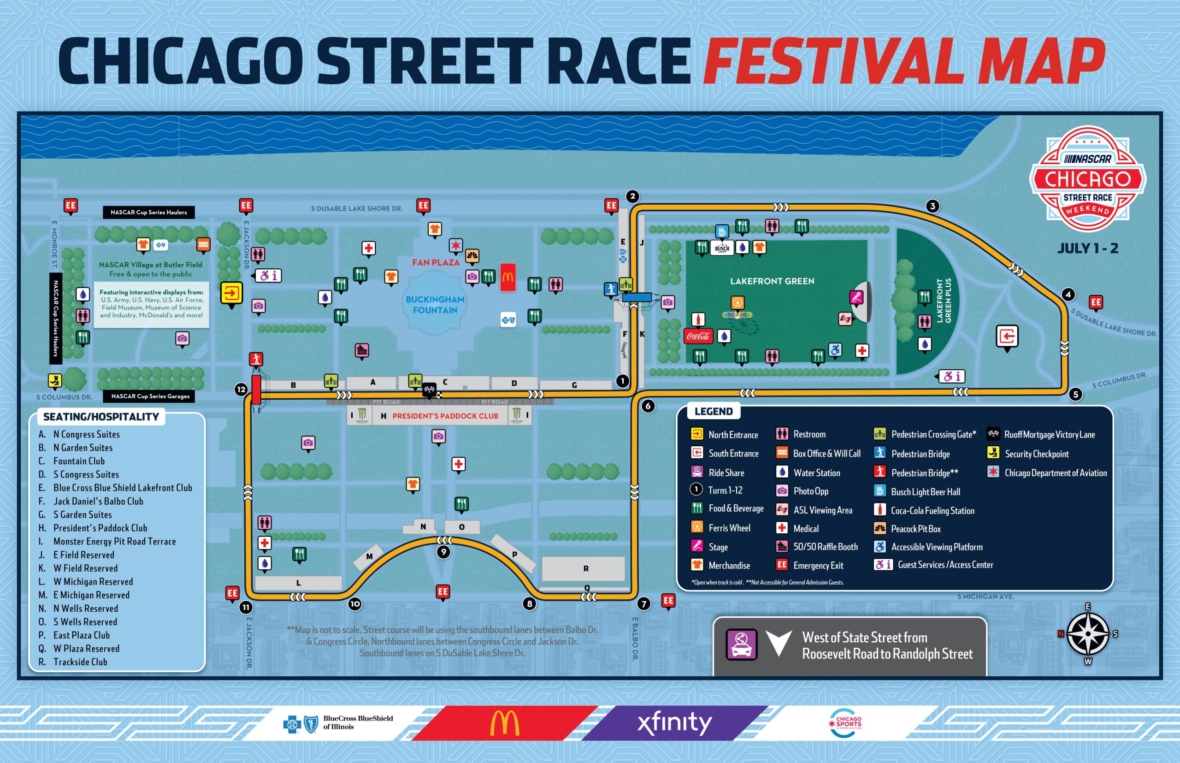
And now for something completely different.
There was a time in the modern history of the NASCAR Cup Series that the schedule was virtually the same for at least a decade at a time. The most diehard fans could expect or hope for over the past 20 years was the occasional shuffling of tracks that comprise the playoffs.
For example, from the moment Chicagoland and Kansas Speedways were added in 2001, a new track would not emerge until Kentucky Speedway in 2012. It took just short of another decade for the winds of change to pick up, but they are very much howling these days.
Absolutely howling.
The past three years alone have seen Bristol Motor Speedway get covered in clay for a dirt race each spring, preseason exhibitions the past two seasons at a makeshift short track inside the Los Angeles Memorial Coliseum, races at traditional venues Gateway and North Wilkesboro, and now a street course race in downtown Chicago.
This isn’t a totally new concept.
After all, street course racing is something Formula 1, IndyCar and Sports Cars do with regularity. It’s also something NASCAR has done with its international divisions in Canada and Mexico. This weekend is also absolutely uncharted territory for the Cup Series and Xfinity Series as it competes for the first time on a temporary street course using actual commuter roads around historic Grant Park.
Michigan Avenue.
Columbus Drive.
Lake Shore Drive.
But why?
NASCAR bringing it’s races to new fans

Simply stated, NASCAR no longer lives in an era of ‘If you build it, they will come,’ and are working diligently to create events where they can bring its product to their fans and potential new audiences alike. Having a race literally inside the third largest city in the country is a heck of a way for NASCAR to bring their show to the masses.
And the Chicago Street Course is indeed a show, holistically.
Saturday will feature a Black Crowes concert prior to the Xfinity Series race on Saturday and TheChainsmokers immediately afterwards. Charley Crockett will open for Miranda Lambert on Sunday before the Cup Series race.
To create that authentic festival atmosphere, NASCAR has contracted Charlie Jones’ Four-Leaf Productions to manage the musical lineup and grandstand construction. This is the same entertainment productions company that founded and produces Lollapalooza — a four-day music festival, also at Grant Park, that attracts nearly 500,000 fans every year.
As if according to plan, Chicago event weekend president Julie Giese says 70 percent of tickets sold thus far have come from attendees not currently in NASCAR’s ticket database.
Corey Lajoie, a third-generation racer and second-generation NASCAR contender, is a bit of a traditionalist but one that also recognizes how special it is to compete in this era. After all, he spent numerous seasons with his dad, two-time Busch Series champion Randy Lajoie, running up and down the same roads year after year.
That hasn’t been the case during his tenure.
“Oh man, it’s really cool,” Lajoie said. “Having these one-off, new events puts a team like ours at a disadvantage because we don’t have a notebook … but as a time for the sport, I think it’s an awesome time to be a motorsports fan right now, but especially in NASCAR.
“To be the first to fire off at the Coliseum and now a street course race, that’s going to be pretty neat. But you also want to be one of the guys they’re talking about after the race and that’s what we’re going to try to do.”
NASCAR heavily invested in Chicago race
NASCAR has invested a lot into this event. According to FOX Sports, it is paying the Chicago parks department $500,000 plus $2 per ticket and 15 percent of net commissions on concessions and merchandise sold. For the sanctioning body, it’s an investment into its future.
With that in mind, what will determine if the weekend is a success?
Television ratings for one, says Joe Gibbs Racing veteran Denny Hamlin, who also has a unique vantage point as a team owner alongside Michael Jordan at 23XI Racing.
“But also creating new fans and bringing a race to them,” Hamlin said last weekend before the race at Nashville Superspeedway. “You want a good crowd at the race track and the ratings to have a bump. The racing can be whatever.”
Giese says NASCAR wants to showcase its personalities and product but also be good stewards for the Second City as well.
“First and foremost is minimizing those disruptions in and around the community,” Giese said. “And for us, making sure everybody in Chicago is aware of what’s happening and how to move around. That’s critical for us. … And then obviously I think things like TV viewership and attendance and those types of things are obviously incredibly important and making sure that we are showcasing the city.
“I feel confident that … from the images to the broadcast to just the coverage in general, I think the beauty of the city is going to shine through.”
This is important because a successful event weekend in Chicago could open up countless new markets for NASCAR domestically and internationally.
Imagine a race in Seattle, New York, Toronto, Sydney or anywhere in Europe, because NASCAR certainly is, too.
While the industry has worked hard to create a layout that could produce exciting racing, 2020 Cup Series champion Chase Elliott says the racing is secondary to the event — that this is a party first and a race second.
“You’re tapping into a part of the country that I think has a lot of race fans, a lot of NASCAR fans, but into city limits that a lot of those people might not typically come out to Joliet,” said Elliott, referencing nearby Chicagoland Speedway.
“For them, I think it’s about it being a good event and it being exciting for them. … That needs to feel like the event that weekend over a Cubs game or whatever it may be. I think that will make it successful from a promoter’s standpoint. From the racing side, I don’t think I have to leave the racetrack and think, ‘Oh wow, that was a really great race’ for it to be successful to the viewership or the people that show up in attendance.”
‘You take your product to the people … right to a city’
Erik Jones of Legacy Motor Club says the Xfinity Series race on Saturday will probably be the more traditionally entertaining race, but only because the current Cup Series car still struggles to perform on high-braking circuits like short tracks and road courses.
“We’re just not there with this car yet,” Jones told Sportsnaut. “I think of our short track races, North Wilkesboro was not the most earth-shattering day for us as far on track product performance. It’s a work in progress. I don’t want fans to lose hope in this car because there are some tests and fixes coming, but until we get there, there are going to be tracks that are a struggle. Chicago is one those tracks for this car.”
Trackhouse Racing owner Justin Marks has made numerous street course appearances behind the wheel across various sports car disciplines. It’s a passion of his but he also recognizes this layout could be a challenge for Stock Cars. He’s also entered the Xfinity Series race to find out himself.
“It’s a big unknown as far as how next week is going to go,” said Marks. “I think street racing requires a lot of restraint. It requires a lot of patience and intelligent race craft.
“My hope is we have an event where there’s a lot of green-flag racing. I think the potential is there that we don’t. I think all the competitors in the sport, everybody, is going to have to do a lot of work this week to make sure that everybody is prepared to race in a forum like that, in an environment like that.”
Full circle, this is radically different for the highest levels of NASCAR. There are a handful of traditionalists that have decried racing on city streets or not having a traditional garage space or even having to walk to the track from nearby hotels.
It’s all new, but Marks also said it’s absolutely vital for the continued growth of the sport.
“We’re living in a time where we have to make what we do as a sport, as a business, we have to make that as accessible and easy to as many people as possible,” Marks said. “We can’t have people work hard to try to find us, try to come to our races, do what we do.
“When you go street racing, you take your product to the people. You take it right to a city.”
Matt Weaver is a Motorsports Insider for Sportsnaut. Follow him on Twitter.
